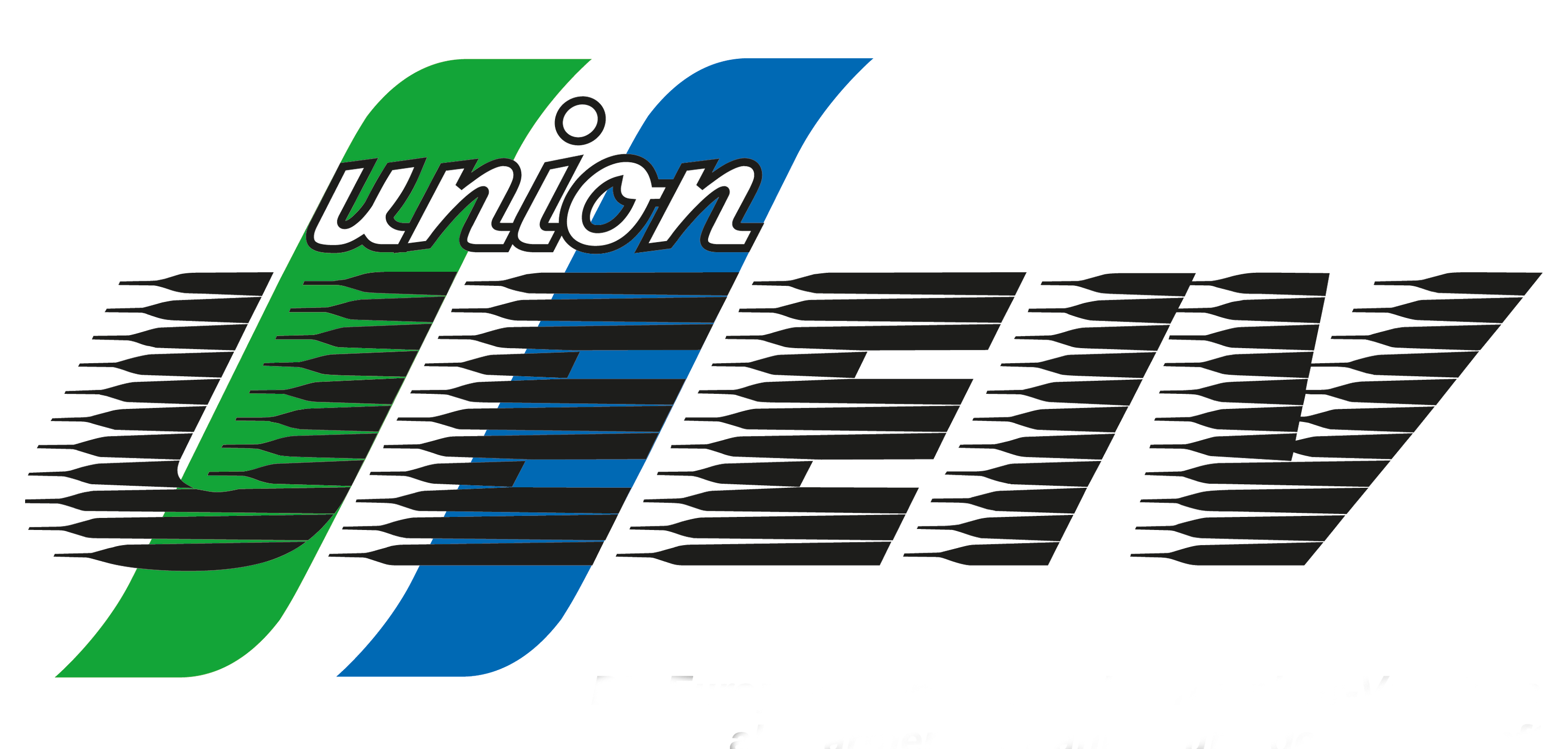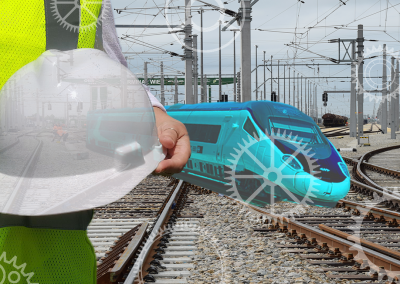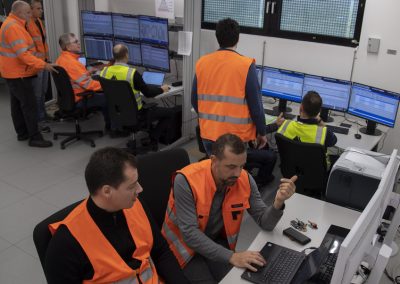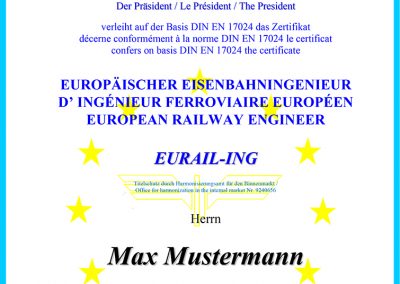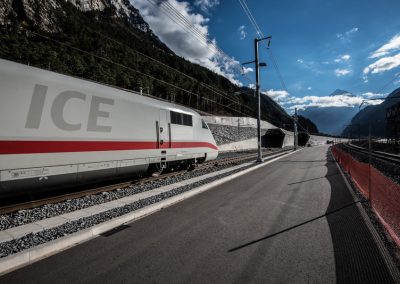EURAIL-ING Certification
WHY BECOME A CERTIFIED EUROPEAN RAILWAY ENGINEER ?
Development of the railways in Europe
The European railways are growing closer together.
State borders are no longer railway borders. The national rail networks have been opened for third parties.
The EU regulates the overall European harmonization of the technology and the rail services. The market of the railway industry and the railway economy is increasingly focused on Europe. The process of transforming state railways into commercial undertakings is progressing. Firms are participating in invitations to bid all across Europe. This requires great flexibility from the engineers.
Major tasks and responsibilities that were previously carried out by the railways are being outsourced to other companies.
Opportunities and Advantages
The certificate “European Railway Engineer” verifies the qualification of engineers and firms for the performance of engineering services in the railway sector!
Following a quality assurance procedure, the Union of European Railway Engineer Associations – UEEIV is authorized to issue certificates upon request.
In detail, the certificate provides
►for the railway engineers:
- motivation for further personal development,
- improved opportunities for employment,
- enhanced possibilities of professional development and
- easier professional mobility within Europe.
►for the railway authorities and firms
- greater security when selecting contractors and awarding contracts.
►for firms in the railway industry and business
- a better chance of being awarded contracts due to proof of availability of specialists
a guarantee of the assurance of high-quality services and - a selection criterion for employing railway engineers.
Meet new requirements
The changes on the railways and in the railway industry have resulted in increased requirements to be met by the railway engineers.
The railway engineer must prove that he is prepared for these new requirements. This means he must continuously expand and adapt his specialist knowledge. Internationally recognized diplomas and certificates are needed to document this.
- The railway engineer must expand and produce evidence of his special qualifications in order to find employment with railways, authorities and contracting firms.
- Railway administrations will place orders only with firms that employ qualified personnel and can also prove this.
- Firms that tender for contracts in the railway sector must prove that they employ railway engineers who are sufficiently qualified.
Purpose of the certification
- to improve the position, role and responsibility of the engineer within society,
- to provide a basis for mutual acknowledgement of professional qualifications in Europe,
- to promote professional training and qualification of engineers by continual review of requirements,
- to provide employers with meaningful documents about the entire professional training of an engineer,
- to give firms the possibility to advertise with the availability of certified “European Railway Engineers” (EURAIL-ING) and
- at the same time encourage the railways to award contracts in the framework of calls for tenders giving priority to those firms that employ certified personnel.
REQUIREMENTS
Targets
Engineers who have railway expertise or who have acquired corresponding knowledge in several years of practical work are to be certified as competent to work in this field.
Requirements
The following persons are eligible for the EURAIL-ING Certification:
- Railway engineers* with specific studies and practical experience (together min. 10 years)
- or persons with associated academic training (natural sciences, computer science, business administration, economics, law) who have worked for a period of at least 10 years as an engineer for railway companies, for companies that produce or plan for the railways or have been active in railway research and teaching.
*Railway engineers are engineers who have a diploma (including Bachelor and Master, as well as engineers from HTL – Höhere Technische Lehranstalt (specific Austrian Higher Institutes of Technical Education)), test certificate or state examination and are working with railways, railway administrations and railway authorities, transport companies and transport administrations, in railwayrelated research and education at universities and colleges and/or firms who plan, build and supply railway-related materials, plants and vehicles for the above-mentioned institutions.
Studies
- Completion of engineering studies at a state-recognised European university, college or specialised institute of higher
education or equivalent education. - Duration of studies: at least 3 years (6 semesters) or part-time studies of equivalent length.
- Railway-specific knowledge in addition to the specialist knowledge gained through a special subject of engineering studies
(traffic system theory, vehicle service, electric railways, traffic safety systems, overland transport engineering (incl. railway
operation), dynamics of vehicle movement, transport engineering, ergonomics, automation technology, environment and traffic,
technical foundations of traffic, information technology, logistics, quality assurance, traffic management, marketing, business
economics, environmental, contractual, liability and European law, standardisation, patent law, geodesy, railway guidelines,
railway standards). - Knowledge of professional terminology in at least one foreign language.
- Further education: Proof of participation in further education courses within the last three years
Practical experience
The following is recognised as practical experience:
- Proof of nationally required state examinations or examinations of the railway companies.
- A standard course of study leading to an academic degree and subsequent engineering work for the railways, transport companies and authorities, companies that design and build for transport companies or produce transport-typical facilities, vehicles and equipment or are involved in transport issues in research and educational institutions. The total period of study must be at least ten years.
The studies must have been completed at a European University or educational institution - Work experience is also recognised as practical experience for part-time studies if it is engineering-related.
- The special conditions in France must be observed. Previous studies are to be counted towards the total period of study.
Justification: Requirement of the EU Directive on the recognition of professional qualifications Art. 18 and Annex II. - In the case of degrees not specific to railways, additional evidence must be provided (this also applies to systems engineers if their studies were not railway-related):
- at least two semesters of railway-specific in-depth studies
- or additional railway-specific training with the railways, transport companies, transport authorities or companies providing for the railway companies other transport companies, or at external educational institutions
- 10 years of engineering experience with railways, authorities or railway related companies. A certification interview shall be held with the applicant
(according to II 2.3.4.1, Para. 2) or certified references must be obtained
Application documents
• fill in the online application form
• a curriculum vitae in tabular form
• proof of education and further education (copies of certificates) ***
• proof of subject of study and examination subjects
• proof of state examinations and railway-specific examinations ***
• proof of duration and type of occupation in the railway sector ***
• proof of participation in projects and achievements in the field of technical engineering ***
• proof of language knowledge ***
• proof of nationally sponsored state-recognised examinations and/or railway examinations of the railways ***
• proof of further education courses during the last three years ***
*** Copies certified by the employer/institution/engineering association required.
Additional basic requirements and certification fees
- Applicants and title holders shall comply with the rules of conduct.
- The holder of the certificate is entitled to bear the title of “European Railway Engineer” in public. Copies of the
certification document may be added to the personnel files of the firms.
The firms have the right to advertise with certified employees and shall indicate, when tendering, that European
Railway Engineers are working in the respective areas. Employers have the right to request appropriate evidence
or to consult the certification register of the UEEIV. - Certification fees will be charged for processing the application and issuing certificates, which are reduced if the applicant is a member of one of the UEEIV member associations.
The UEEIV member associations are listed here: https://www.ueeiv.eu/member-associations/
If the application is rejected, only a partial refund of the fee will be made.
Code of Conduct for European Railway Engineers
The code of conduct is an additional guideline and does not replace the engineer’s commitment to the code of honour to which an engineer is committed in his native country.
All persons enrolled in the certification register are bound to an awareness of the significance of science and technology to mankind and their own responsibility to society within the framework of their professional activity.
They carry out their occupations in harmony with generally accepted rules of morality and civilisation within European social structures. They recognise, in particular, the personal dignity of all those with whom they work.
With this in mind, they undertake to adhere to and uphold the following code of conduct.
Personal Conduct
The railway engineer shall maintain his professional knowledge at the highest possible level to achieve outstanding performance in accordance with current regulations and consideration for the law of the country in question.
His professional integrity and his intellectual honour ensure unbiased analysis and judgements of a situation as well as his respective decision.
He is conscious of his moral obligation to confidentiality in every business agreement to which he has voluntarily become party. He accepts no payments in connection with business agreements which are not agreed to by the employer.
He gives evidence of his standing as an engineer by participating in the activities of his professional associations, particularly those which further the professions and contribute to the on-going education of their members.
The railway engineer only uses his title when he is legally entitled to do so.
Professional conduct
The railway engineer accepts only those tasks for which he is fully qualified. He consults with appropriate experts if an assignment exceeds his competence. He accepts responsibility for the organisation and performance of his assignments.
He ensures that a technically high-quality result is produced. When carrying out a job he resorts to all measures necessary:
- to ensure the safety of human life and property,
- to secure and promote a healthy and desirable environment for mankind.
The railway engineer advocates the development and operation of environmentally friendly traffic systems in a meaningful context of the national economy.
He encourages fair competition between transport carriers and the creation of corresponding framework conditions and for the consistent deployment of new techniques, processes and technologies. He engages in an intensive international exchange of information thus promoting the assimilation of European railways at a high level.
Social conduct
The railway engineer shall:
- respect the personal and occupational rights of his superiors, his colleagues and his subordinates by treating their needs and suggestions with fairness to the extent that these fall within the scope of the laws and the ethics of his profession,
- show respect for nature, environment, health and safety and work toward the well-being of mankind,
- supply the public – to the extent that this lies within the scope of his responsibility – with clear information to transmit adequate understanding of the technical problems,
- show the greatest respect for traditional and cultural values of the countries in which he carries out his profession.
